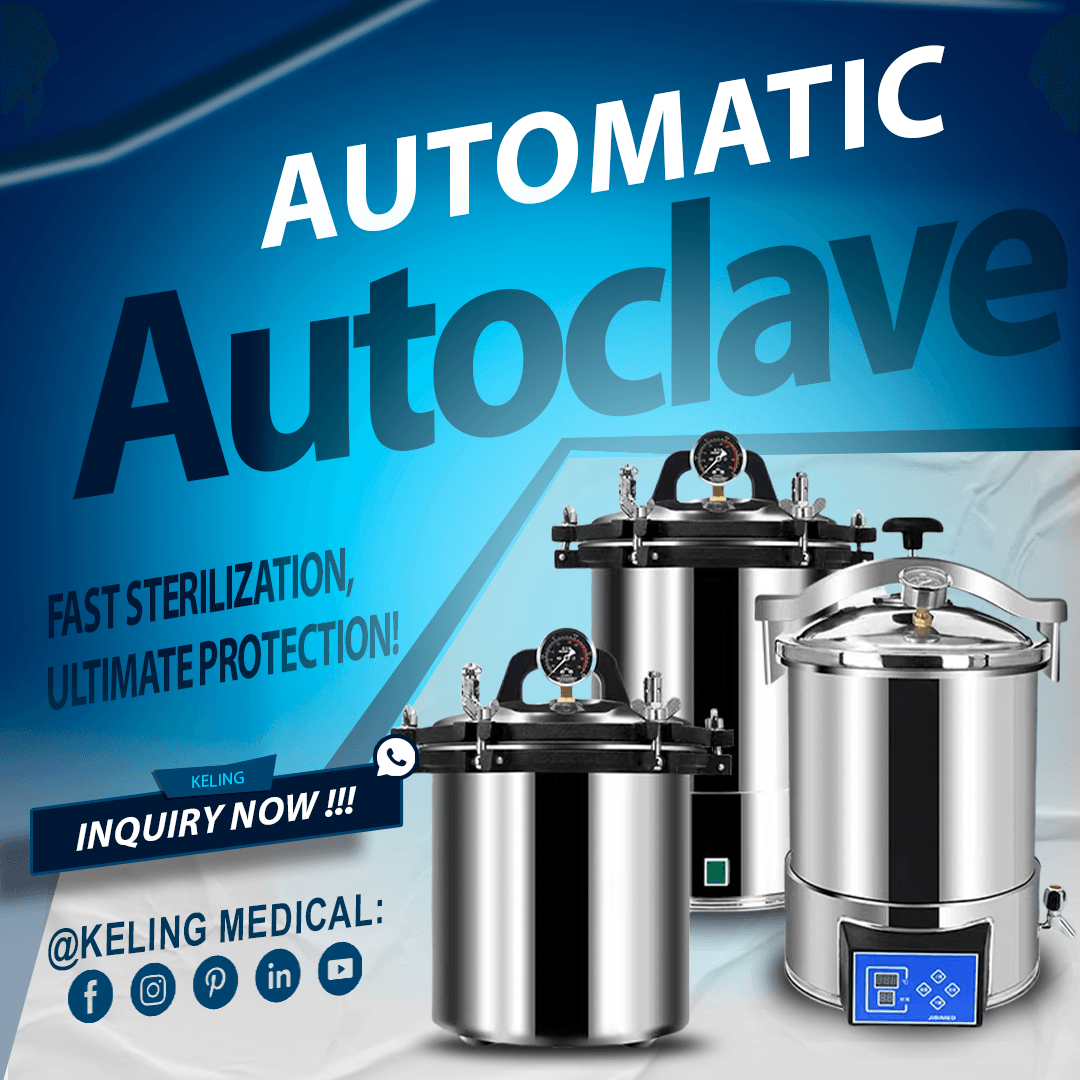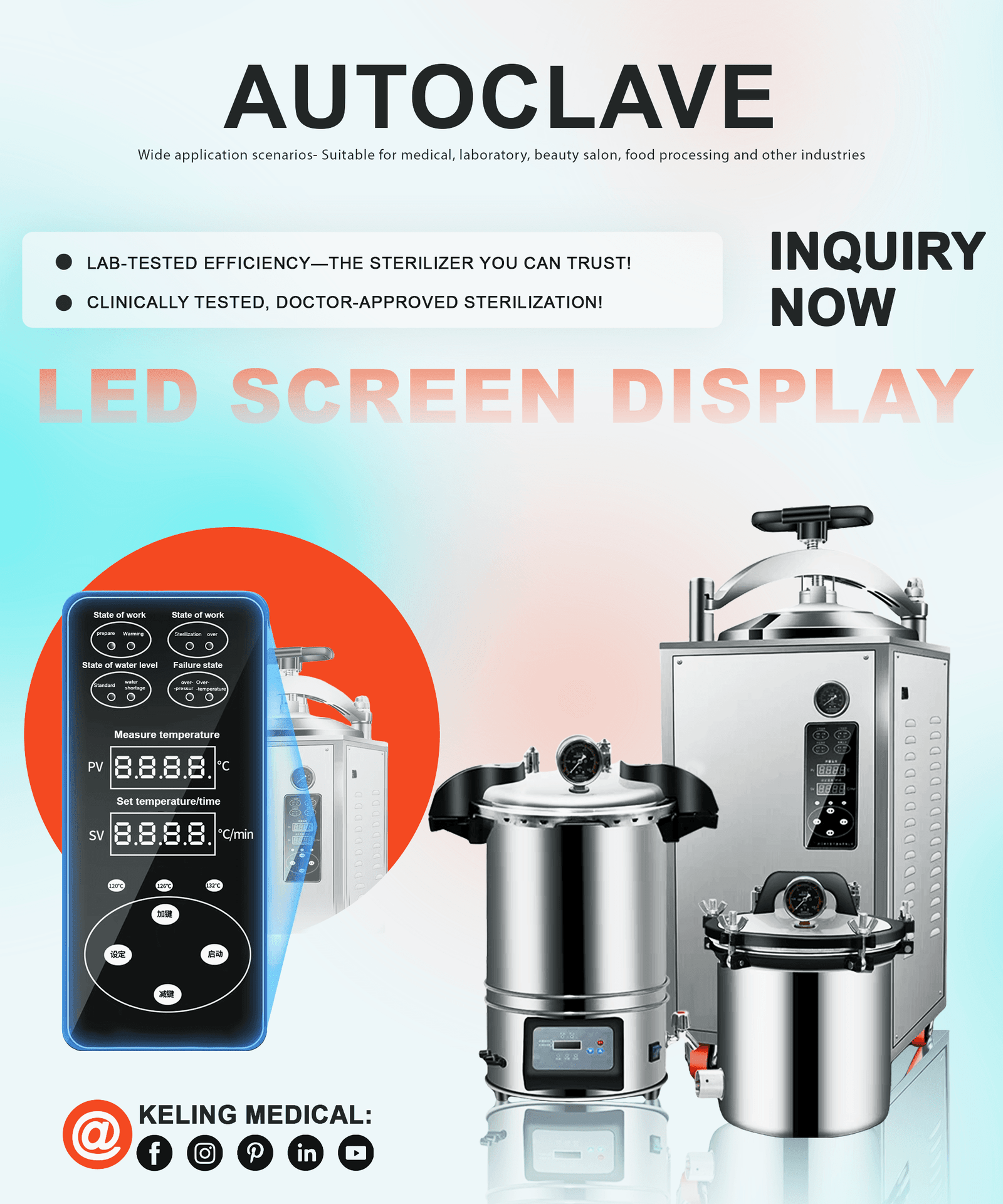
Sterilization Cycles:
The gravity displacement method provides a cost-effective solution for sterilizing solid instruments by using steam to remove air.
Pre-Vacuum technology provides advanced air extraction for hollow instruments and porous loads to achieve top-notch sterilization.
Flash Cycles deliver fast sterilization solutions for instruments that remain unpackaged during urgent situations.
Chamber Size and Configuration:
The compact (N-Type) autoclave works well in small clinics that have restricted space available.
General medical practices should use this medium (S-Type) sterilizer when their instrument volume falls within moderate levels.
This model serves high-volume medical facilities including clinics, hospitals, and sterilization centers.
Control Systems and User Interface:
Digital Displays show current cycle details together with temperature and pressure measurements.
Users can modify sterilization cycles through programmable settings for different load types and specific sterilization needs.
Data Logging and Traceability functions as an important tool for maintaining compliance documentation and establishing audit trails.
International Standards:
EN 13060 (Europe) establishes performance standards for small steam sterilizers.
The ISO 17665 standard covers the validation of sterilization processes alongside routine monitoring requirements.
ANSI/AAMI ST79 (US) presents thorough instructions for steam sterilization procedures within healthcare facilities.
Certification Requirements:
All products sold in the European Economic Area must have CE Marking.
FDA 510(k) Clearance serves as a prerequisite for selling medical devices within the United States.
Documentation and Traceability:
Require suppliers to deliver full documentation sets which must contain validation reports alongside user manuals and maintenance records.
Establish advanced inventory management systems which monitor autoclave utilization, maintenance activities, and essential compliance paperwork.
Manufacturing Expertise:
Select manufacturers that demonstrate both deep experience within the dental sector and a dedication to advancing their technology.
Identify manufacturers that hold ISO 13485 certification which shows compliance with medical device quality management standards.
Product Quality and Reliability:
Assess how construction materials like stainless steel chambers and corrosion-resistant components withstand wear over time.
Request detailed information on quality control processes by asking about pre-shipment testing protocols together with performance validation methods.
After-Sales Support and Service:
Evaluate how accessible technical support resources are for on-site installation services as well as training and troubleshooting help.
Request information on warranty terms and ask about the availability of spare parts and maintenance programs to prevent breakdowns.
Eco-Friendly Solutions:
There is an increasing demand for autoclaves that use less water and operate at lower costs while maximizing energy efficiency.
Select autoclave models that contain environmental-friendly attributes including standby modes and systems for heat recovery.
Smart Autoclaves and Connectivity:
Remote monitoring capabilities combined with data analysis and predictive maintenance through Internet of Things (IoT) technology integration.
Cloud-based platforms deliver improved data protection mechanisms along with capabilities for remote diagnostic assessments and automated regulatory reporting functions.
Advanced Sterilization Technologies:
Alternative sterilization methods are being investigated including low-temperature sterilization techniques and ozone disinfection processes.
To provide clients with advanced solutions, keep up-to-date with emerging technological developments.
Comprehensive Training and Education:
Your clients need complete training about how to operate autoclaves and maintain them along with proper infection control procedures.
Provide continuing education opportunities to help them stay informed about best practices and regulatory updates.
Value-Added Services:
Your clients can benefit from bundled service packages that encompass installation, validation, and ongoing maintenance work.
By evaluating financing solutions and leasing programs your clients can acquire autoclaves more easily.
Building Long-Term Partnerships:
Develop robust client relationships with continuous support and by delivering personalized solutions and addressing their issues.
Establish yourself as both a reliable expert and collaborative partner in helping them achieve the best infection control practices.
Medical equipment distributors who understand both the technology and regulatory requirements along with changing customer demands will find substantial opportunities available in the dental autoclave market. Developing relationships with established manufacturers while offering outstanding service and monitoring market trends enables you to secure a powerful position in the market which leads to long-lasting business growth.
Q1: What is the typical lifespan of a dental autoclave? A: With proper maintenance and care, a high-quality dental autoclave can last 10-15 years or even longer.
Q2: How often should a dental autoclave be serviced? A: It is recommended to have your autoclave serviced annually by a qualified technician. Additionally, regular preventative maintenance, as outlined in the user manual, should be performed.
Q3: What are the most common causes of autoclave malfunction? A: Common issues include inadequate water quality, improper loading techniques, and wear and tear of seals and gaskets.
Q4: Can I purchase an autoclave from one country and use it in another? A: Voltage requirements and regulatory standards vary by country. It is crucial to ensure the autoclave you choose complies with the regulations of the intended use location.
Q5: What are the key factors to consider when choosing between a gravity displacement and a pre-vacuum autoclave? A: The type of instruments you sterilize, load volume, and budget constraints are important factors to consider. Pre-vacuum autoclaves offer superior sterilization for complex instruments and porous loads but typically come at a higher price point.
Ready to elevate your dental autoclave offerings?
Contact Keling Medical today for:
Comprehensive product catalogs and technical specifications
Competitive pricing and flexible order quantities
Expert guidance on regulatory compliance and market trends
Unwavering commitment to quality and customer satisfaction
Let’s build a successful partnership!
Email: inquiry@shkeling.com WhatsApp: +86 182 2182 2482 Website: https://autoclaveequipment.com/

Introduction Autoclave machines used in hospitals are one of the most important investments in healthcare infrastructure, serving as the first line of defense against healthcare-associated infections. Sophisticated sterilization equipment is

The autoclaving process serves as an essential sterilization practice utilized across medical, laboratory, and research facilities to protect glassware and instruments through effective sterilization. High-pressure steam eliminates pathogens during this

The autoclaving process serves as an essential sterilization practice utilized across medical, laboratory, and research facilities to protect glassware and instruments through effective sterilization. High-pressure steam eliminates pathogens during this

The autoclaving process serves as an essential sterilization practice utilized across medical, laboratory, and research facilities to protect glassware and instruments through effective sterilization. High-pressure steam eliminates pathogens during this

The autoclaving process serves as an essential sterilization practice utilized across medical, laboratory, and research facilities to protect glassware and instruments through effective sterilization. High-pressure steam eliminates pathogens during this
The autoclaving process serves as an essential sterilization practice utilized across medical, laboratory, and research facilities to protect glassware and instruments through effective sterilization. High-pressure steam eliminates pathogens during this